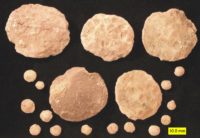By Sarah Chaffee In this ID the Future from the vault, hear an interview with Dr. Richard Sternberg, evolutionary biologist and CSC Senior Fellow, whose discussion of whale origins is featured in Illustra Media’s documentary, Living Waters: Intelligent Design in the Oceans of the Earth. Sternberg critiques whale evolution, noting that the timespan is too short for the bodyplan modifications needed to transition from a land mammal to a whale. Please consider donating to support the IDTF Podcast. Your browser does not support playing Audio, please upgrade your browser or find our podcast on podOmatic Download Episode …read more Source: [More]
By Sarah Chaffee On this episode of ID the Future, host Jay Richards talks with Fr. Michael Chaberek about Charles Darwin and medieval scholar Thomas Aquinas, one of the most influential of all Western philosophers, and especially central in Roman Catholic thinking. Many Catholic scholars support neo-Darwinism and insist that Aquinas’s work nicely harmonizes with neo-Darwinism. Chaberek, author of the recent book Aquinas and Evolution, and creator of the new website Aquinas.design, offers several reasons to conclude otherwise. A clarifying note on terminology: When Chaberek and Richards speak of “accidents” and “accidental changes,” they don’t mean it in the common [More]
By Sarah Chaffee On this episode of ID the Future host Mike Keas talks a third time with Michael Flannery about Flannery’s new book Nature’s Prophet: Alfred Russel Wallace and His Evolution from Natural Selection to Natural Theology. The surprising word come out of this conversation is how open Darwin was to Wallace’s opposing viewpoint — unlike many Darwinists today. Some of Flannery’s recent experience with historians of science, though, shows there is at least hope in some quarters for increasing academic openness today. Please consider donating to support the IDTF Podcast. Your browser does not support playing Audio, please [More]
By Sarah Chaffee On this episode of ID the Future, Michael Flannery, historian of science and emeritus professor from the University of Alabama at Birmingham, discusses how Alfred Russel Wallace, co-founder of the theory of evolution by natural selection, broke with Darwin by arguing that the rise of humans required something more than blind evolutionary mechanisms. As Flannery also notes, the great geologist Charles Lyell sided with Wallace in the debate, to Darwin’s dismay. Listen in to learn more about Lyell’s idea of uniformity, the pro-Darwinian origins of the journal Nature, and how professional dissent from Darwinism has existed and [More]
By Sarah Chaffee In this episode of ID the Future from the vault, hear about electricity and bioluminescence, as highlighted in Dr. Geoffrey Simmons’ book, Billions of Missing Links. Listen in to learn about how a knee jerk reaction, eels, and the knife fish all use electrical impulses. Please consider donating to support the IDTF Podcast. Your browser does not support playing Audio, please upgrade your browser or find our podcast on podOmatic Download Episode …read more Source: id the future
Many secular scientists extrapolate current seafloor sediment deposit rates. They then publish Earth age assignments of millions of years. Are they following the scientific method? How do manganese nodules present problems for old-Earth proponents? Does evidence line up with recent creation and the global Genesis Flood? Listen: The Institute for Creation Research
Is the “God particle” truly “a blow to the Christian faith,” or “a nail in the coffin of religion”? Where does reality end and hype begin? Dr. Hebert exposes the flaws of the Big Bang theory and offers a logical evaluation of the scientific community. Listen: The Institute for Creation Research
By Sarah Chaffee On this episode of ID the Future historian Michael Flannery continues discussion of his new book Nature’s Prophet: Alfred Russel Wallace and His Evolution from Natural Selection to Natural Theology. Flannery tells how Wallace became convinced of some “overruling intelligence” in nature — not because of “gaps” in what he knew, but because so many human attributes demand a better explanation than Darwin’s own “utility principle.” They called for a cause adequate to the effects. Please consider donating to support the IDTF Podcast. Your browser does not support playing Audio, please upgrade your browser or find our
By Sarah Chaffee On this episode of ID the Future from the vault, Dr. Cornelius Hunter talks about his website Darwin’s Predictions, which critically examines 22 fundamental predictions of evolutionary theory. In this fourth and final podcast of the series, Dr. Hunter discusses evolution’s failed prediction that competition should be greatest between neighbors. Your browser does not support playing Audio, please upgrade your browser or find our podcast on podOmatic Download Episode …read more Source: id the future
By Sarah Chaffee On this episode of ID the Future, Jorn Dyerberg, the Danish biologist and co-discoverer of the role of omega-3 fatty acids in human health and nutrition, talks with Brian Miller about finding irreducible complexity in cells 40 years ago. It wasn’t until he encountered ID researchers like Michael Behe that he gave it that name — but he saw how many enzymes and co-enzymes it took working together to make metabolism work in every living cell. And if neo-Darwinism is true, and these enzymes showed up one at a time, “And over these eons, the other enzymes [More]
By Sarah Chaffee On this episode of ID the Future, historian Michael Flannery discusses his just-released book Nature’s Prophet: Alfred Russel Wallace and His Evolution from Natural Selection to Natural Theology. It’s the intellectual history of Wallace, who is credited with independently propounding the the theory of evolution by natural selection. Darwin insisted on a purely materialistic version of the theory, but as Wallace studied the evidence, he grew convinced that intelligent design also played a role in the history of life, particularly in the origin of humans. Though not a religious person, he broke with the rising scientism of [More]
By Sarah Chaffee On this episode of ID the Future, author and professor Nancy Pearcey draws on her new book Love Thy Body: Answering Hard Questions About Life and Sexuality to explore two inconsistencies she sees with philosophical materialists. One inconsistency is their unlivable claim that “we have no free will.” The other is the materialist credo to take our cues from nature — except when it comes to the male or female sexual makeup of one’s body. Please consider donating to support the IDTF Podcast. Your browser does not support playing Audio, please upgrade your browser or find our
By Sarah Chaffee On this episode of ID the Future, Casey Luskin talks with Dr. Cornelius Hunter—a Discovery Institute Fellow, adjunct professor, and author—about his website Darwin’s Predictions, which critically examines 22 fundamental predictions of evolutionary theory. In this third podcast of the series, Dr. Hunter discusses how mutations are adaptive and features of James Shapiro’s natural genetic engineering model. Your browser does not support playing Audio, please upgrade your browser or find our podcast on podOmatic Download Episode …read more Source: id the future
By Sarah Chaffee On this episode of ID the Future, Robert Crowther talks with author Jay Richards about Richards’ new book The Human Advantage: The Future of American Work in an Age of Smart Machines. Science fiction tantalizes us — and pundits terrorize us — with images of intelligent machines taking over for humans. Really taking over, as in replacing us. Some thinkers even say that’s just the next phase, since we’re machines ourselves. Jay Richards explains how that’s wrong, and there’s a lot more to hope for than to fear in our future with our new smart machines. Please [More]
By Sarah Chaffee On this episode of ID the Future, host Tod Butterfield talks with CSC Fellow and professor Nancy Pearcey about her new book Love Thy Body: Answering Hard Questions About Life and Sexuality. Who — or what — determines what we are? Why does it matter? And how should we act in light of the answers to those questions? Pearcey explores these questions, and explains how just about everything in ethics — including sexuality — begins with what we think about whether life has a design and a purpose.Please consider donating to support the IDTF Podcast. Your browser [More]
By Sarah Chaffee On this episode of ID the Future, Dr. Cornelius Hunter shares about his website Darwin’s Predictions, which critically examines 22 fundamental predictions of evolutionary theory. In this second podcast of the series, Dr. Hunter discusses the uniqueness of DNA code and differences in fundamental molecules. Please consider donating to support the IDTF Podcast. Your browser does not support playing Audio, please upgrade your browser or find our podcast on podOmatic Download Episode …read more Source: id the future
By Sarah Chaffee Today’s episode of ID the Future features “In the Market” radio host Janet Parshall interviewing Center for Science and Culture senior fellow Jonathan Witt, co-author of the recent book Heretic: One Scientist’s Journey from Darwin to Design. Witt and Parshall discuss the book Heretic, some brave anti-Darwin heretics, and a recent scholarly study claiming to show that greater science education and science literacy encourages acceptance of evolution. Witt highlights what he sees as some glaring problems in the study’s survey, and in the way Darwinian evolution is normally taught. Please consider donating to support the IDTF Podcast. [More]
By Sarah Chaffee On this episode of ID the Future from the vault, Dr. Cornelius Hunter talks about his website Darwin’s Predictions, which critically examines 22 fundamental predictions of evolutionary theory. In this first podcast of the series, Dr. Hunter discusses why he was inspired to pursue this work. Please consider donating to support the IDTF Podcast. Your browser does not support playing Audio, please upgrade your browser or find our podcast on podOmatic Download Episode …read more Source: id the future
By Sarah Chaffee On this episode of ID the Future, Pr. Emeritus Michael Flannery (U of Alabama-Birmingham) continues his discussion of evolutionist Kenneth Miller’s recent book The Human Instinct: How We Evolved to Have Reason, Consciousness, and Free Will. Flannery suggests that Miller’s “theistic evolution” is more precisely Darwinian theism — and that such a marriage is as ultimately hopeless as squaring the proverbial circle. Please consider donating to support the IDTF Podcast. Your browser does not support playing Audio, please upgrade your browser or find our podcast on podOmatic Download Episode …read more Source: id the future
By Sarah Chaffee On this episode of ID the Future from the vault, hear the final segment of Dr. Wolf-Ekkehard Lönnig’s discussion of the long-necked giraffe. Tune in as Lönnig examines the potential of sexual selection as an evolutionary explanation of the long-necked giraffe and considers intelligent design as an alternate explanation. Read his book on the giraffe here! Please consider donating to support the IDTF Podcast. Your browser does not support playing Audio, please upgrade your browser or find our podcast on podOmatic Download Episode …read more Source: id the future
By Sarah Chaffee On this episode of ID the Future, host Mike Keas interviews Professor Emeritus Michael Flannery (U of Alabama-Birmingham) on evolutionist Kenneth Miller’s new book The Human Instinct: How We Evolved to Have Reason, Consciousness, and Free Will. Miller is prominent as a science educator and supporter of Neo-Darwinian theistic evolution. Flannery, a historian of science, argues that Miller’s attempt to defend human exceptionalism on Neo-Darwinian grounds runs into fatal difficulties, as have similar attempts before. Please consider donating to support the IDTF Podcast. Your browser does not support playing Audio, please upgrade your browser or find our
By Sarah Chaffee On this episode of ID the Future, biologist Ann Gauger responds to a negative review of the new Crossway anthology Theistic Evolution: A Scientific, Philosophical, and Theological Critique, arguing that parts of the review are confused and contradictory. For instance, Denis Lamoureux uses classic design language while denying design. He says design is all front-loaded so that random evolutionary processes can produce designed outcomes, thus changing the meaning of both “random” and “evolution.” He accuses ID of being theologically driven, apparently unaware that it’s theistic evolution that is theological. And he seeks to support faith through appreciation [More]
By Sarah Chaffee On this episode of ID the Future, Dr. Wolf-Ekkehard Lönnig shares more about why the body plan of the long-neck giraffe could not have evolved in a step-by-step Darwinian fashion. He gives an account of the rational design of the giraffe’s recurrent laryngeal nerve, a feature that Richard Dawkins and other evolutionists claim can only be explained by Darwinian evolution. Please consider donating to support the IDTF Podcast. Your browser does not support playing Audio, please upgrade your browser or find our podcast on podOmatic Download Episode …read more Source: id the future
By Sarah Chaffee On this episode of ID the Future, host Sarah Chaffee and microbiologist Ann Gauger discuss panspermia, the topic of a peer-reviewed paper published recently by several very serious scientists. Panspermia tries to sidestep problems in origins biology by suggesting that, to quote the title of an old science fiction movie, “it came from outer space.”And yes, maybe even aliens sent it our way. Maybe (honest — this is a real theory) the first octopuses came here special delivery, as encapsulated embryos falling from the sky. Anything but intelligent design, for these very serious scientists. Please consider donating [More]
By Creation Moments How old is the world’s oldest fossil? The problem is that the term “oldest” implies a timescale, and we may not agree on the nature of that timescale. For example, deep-time evolutionists assume that the Earth is 4.5 billion years old, whereas creationists show that the age of the Earth given in the Bible is about 6,000 years. read more …read more Source: Creation Moments
By Creation Moments An article in the Los Angeles Times about a recent fossil find began: If it walks like a duck and swims like a duck, it might be a dinosaur. read more …read more Source: Creation Moments
By Creation Moments Astronomers have apparently witnessed a collision between two neutron stars. This collision apparently produced gold, worth about $10 octillion (109). But before you jump in your car to go and collect some of this bounty, you need to know that this collision occurred 130 million light years away. The discovery, such as it is, was reported by a number of news agencies in October 2017. read more …read more Source: Creation Moments

















![Bill & Gloria Gaither – That’s Important to Me [Live] Bill & Gloria Gaither – That’s Important to Me [Live]](http://img.youtube.com/vi/FeJTajMx3Bc/0.jpg)


